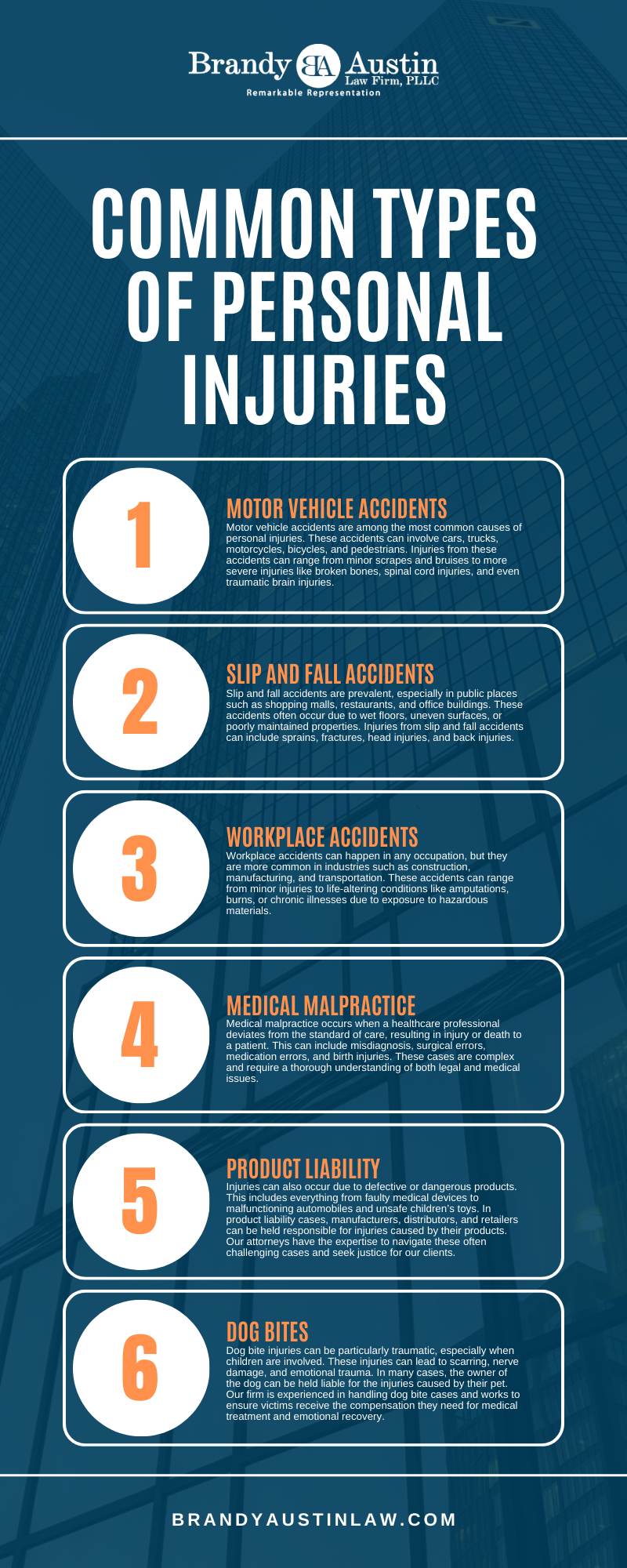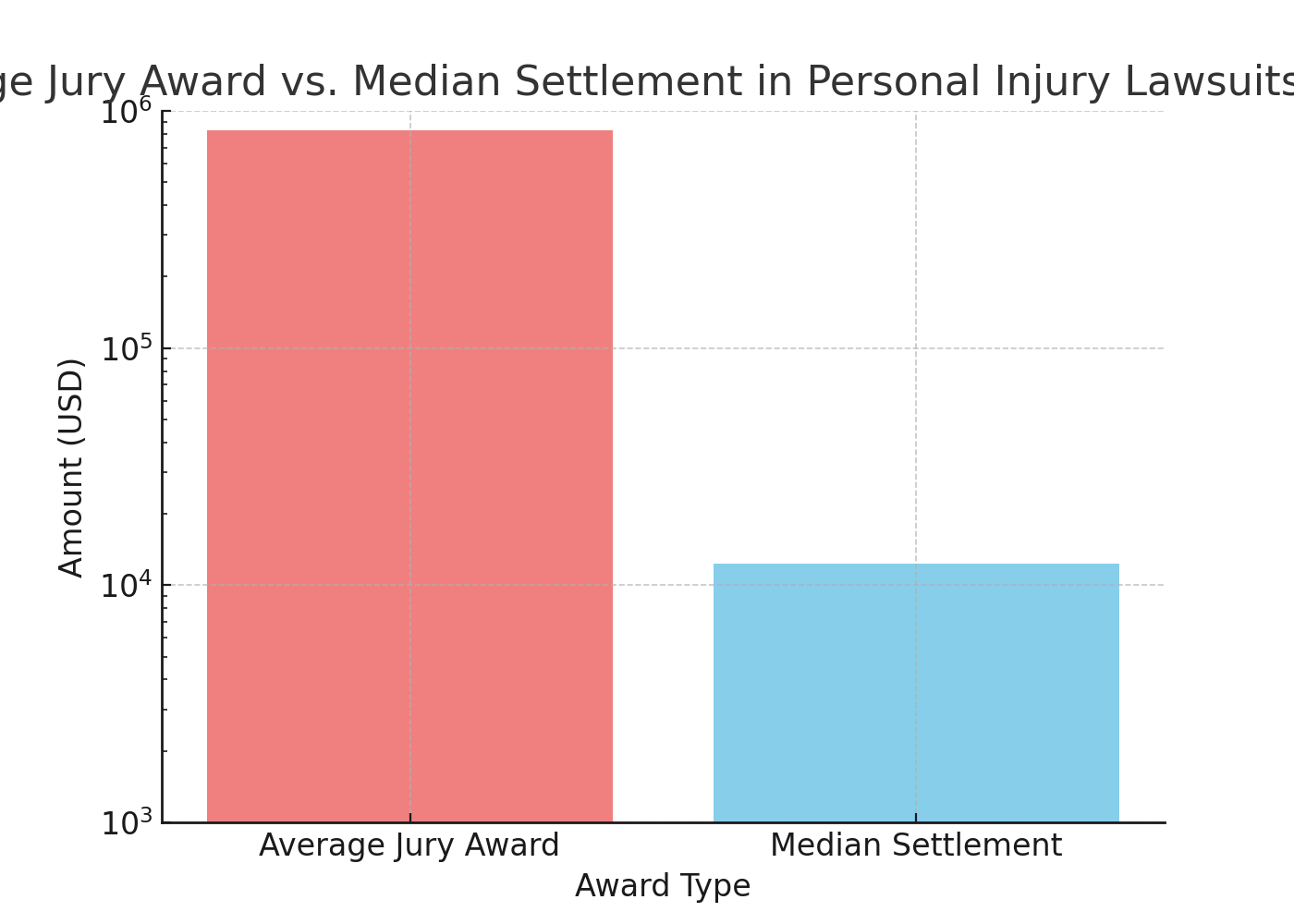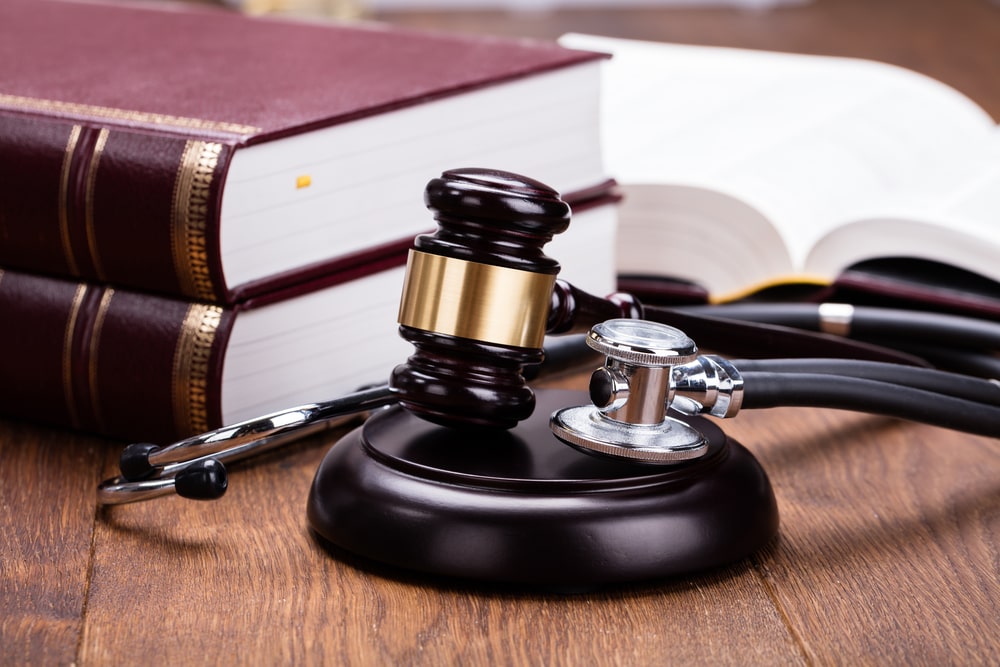Dallas Personal Injury Lawyer

Recovering Compensation After a Personal Injury Accident
Our Dallas, TX personal injury lawyer helps victims of negligence assert their rights to compensation and hold the at-fault person or entity accountable for the harm their negligence caused.
At Brandy Austin Law Firm, we help people who were hurt in car wrecks, in an accident on someone else’s property, or who suffered because of exposure to toxic substances. Our firm has extensive resources to demand justice on your behalf and hold the at-fault party accountable for the harm they caused. We want to help you—call today for a free consultation!
How Our Personal Injury Lawyer Can Help
Personal injury lawyers are civil attorneys who represent the interests of people who were harmed and suffered losses due to the negligence of a person or an entity, like a healthcare facility or a consumer products manufacturer.
Suppose you suffered damages, including material damages like medical bills and property damages, or had to miss work due to your injuries. In that case, a personal injury attorney can help you assert your legal right to compensation from the at-fault party (or, usually, their insurance company, which often pays the claim).
The crux of a personal injury claim rests on the legal concept of negligence, meaning that another person or entity had a certain duty of care for your safety but abandoned that duty of care, leading to the incident that caused you harm. Your lawyer gathers evidence to prove that the other party (the defendant) was negligent and then demands that they do right by you.
Compensation For A Personal Injury Claim
Damages refer to the total value of your losses, both economic and non-economic. Part of your lawyer’s job is properly valuing your claim to ensure that the Demand Letter or lawsuit requests an appropriate amount in damages. Not only are you entitled to the full value of your economic losses, but the defendant may also owe you consideration for the pain and suffering from your injuries and the trauma of the experience.
We have plenty of resources to build your claim, including economic and medical experts who can testify to the extent of your injuries, projected future medical care, and the value of your lost wages and, if applicable, loss of earning potential if your injuries are disabling. We know the tricks insurance companies may try to pull to minimize your claim, and we have the skills to disarm their arguments.
Steps To Follow After An Injury
Suffering a serious personal injury can be a life-altering event. It’s not just the physical pain that victims have to contend with, but also the emotional distress and financial burden that can follow.
Knowing the right steps to take immediately after such an incident can make a significant difference in the recovery process and the outcome of any legal claims. Our seasoned Dallas personal injury lawyer guides our clients through these critical steps to ensure they are well-positioned for recovery and justice.
Seek Immediate Medical Attention
The first and most crucial step after suffering a personal injury is to seek medical attention. Even if the injury seems minor, it’s essential to have a medical professional evaluate your condition. Some injuries, especially those related to the head or spine, may not show immediate symptoms but can have long-term implications. Documentation of your injuries by a healthcare provider is also critical should you need to pursue a legal claim.
Report The Incident
Depending on the nature of the injury, it’s essential to report the incident to the appropriate authorities. For example, in the case of a car accident, you should report to the police. For a workplace injury, report to your employer. This step is vital in creating an official record of the event, which can be crucial in any legal proceedings.
Document Everything
Documentation is key in personal injury cases. Take photographs of your injuries, the accident scene, and anything else that might be relevant. Keep a diary of your physical and emotional state following the injury. Also, save all medical records and receipts related to treatments you receive. This information will be invaluable when building your case.
Avoid Discussing Your Case
It’s important to be cautious about whom you discuss your case with. Avoid posting details about your injury or legal case on social media. Additionally, be wary of discussing your case with insurance adjusters or representatives from the other party involved in the incident. They may use your words against you in legal proceedings.
Understand Your Rights And Options
A knowledgeable attorney can explain your rights and the various options available to you. This might include filing an insurance claim or a personal injury lawsuit. Understanding these options and the potential outcomes is crucial in making informed decisions about your case.
Follow Through With Treatment
Following through with your prescribed medical treatment is crucial for your physical recovery and your legal claim. Failure to adhere to treatment plans can negatively impact your claim, as it may be argued that you did not take the necessary steps to mitigate the effects of your injury.
Keep Communication Open With Your Attorney
Throughout the process, maintain open and honest communication with your attorney. At Brandy Austin Law, we place a high value on client communication. Keeping us updated on your medical progress and any challenges you face allows us to provide the most effective representation.
Strategies Personal Injury Lawyers Use To Win Tough Cases
Personal injury cases can be complex and challenging, especially when they involve disputes over liability or damages. While each case is different, there are several proven strategies that our Dallas personal injury lawyers from Brandy Austin Law have successfully used in negotiations and in the courtroom:
- Thorough Investigation And Evidence Gathering
The foundation of any strong personal injury case is thorough investigation and gathering of evidence. Lawyers meticulously collect all relevant documentation, including medical records, police reports, photographs of the scene, witness statements, and video footage if available. They may also hire expert investigators to reconstruct the accident or analyze specific details.
Solid evidence can make or break a case, so personal injury lawyers focus on building a strong factual foundation to support their client’s claims.
- Proving Negligence With Legal Experience
A core element of most personal injury cases is proving negligence. Personal injury lawyers use their legal expertise to demonstrate that the defendant acted irresponsibly or failed to meet a standard of care, resulting in harm to the plaintiff.
This involves connecting the dots between the defendant’s actions (or lack of action) and the injuries sustained.
- Utilizing Expert Witnesses
Personal injury lawyers often work with medical professionals, accident reconstructionists, economists, and other specialists to provide expert testimony.
These witnesses can help clarify technical aspects of the case, such as the long-term impact of injuries, the physics of an accident, or the projected financial costs of rehabilitation and future care. Expert testimony lends credibility to the case and can significantly influence a jury’s or insurance company’s decision.
- Negotiating Strongly With Insurance Companies
Insurance companies frequently try to minimize payouts in personal injury cases by offering lowball settlements or denying liability altogether.
Experienced personal injury lawyers are skilled negotiators who understand the tactics insurers use and are prepared to counter them. They meticulously calculate the full extent of damages, including medical bills, lost wages, pain and suffering, and future care needs, ensuring that the client is not under-compensated.
- Building A Compelling Narrative For The Case
In addition to presenting hard evidence, personal injury lawyers craft a compelling narrative that tells the client’s story in a way that resonates with the jury, judge, or opposing counsel. This strategy humanizes the client, making their suffering more relatable and persuasive.
A well-crafted narrative combines the facts of the case with emotional and psychological elements to highlight the defendant’s wrongdoing and the client’s need for justice.
- Preparing For Trial And Litigation
While many personal injury cases settle out of court, experienced lawyers always prepare as if the case will go to trial. This preparation involves gathering additional evidence, lining up witnesses, and developing a clear legal argument.
Having a solid trial strategy often gives the lawyer leverage in settlement negotiations, as insurance companies may prefer to avoid the costs and risks of a trial.
- Maintaining Client Communication And Trust
Throughout the process, personal injury lawyers maintain open lines of communication with their clients. They keep them informed about the case’s progress, explain legal options, and manage expectations.
Trust and transparency are key to a strong attorney-client relationship, which can help ensure the client remains engaged and cooperative throughout the legal process.
Dallas Personal Injury Infographic

Texas Personal Injury Statistics
According to the Lawsuit Information Center, the average verdict in a personal injury lawsuit in Texas is $826,892, while the median personal injury settlement award is just $12,281. That’s a big gap—big enough to drive a truck through. Why is there such a difference between a jury award and a negotiated settlement in personal injury claims?
The difference between a jury award and a negotiated settlement in personal injury claims often stems from various factors related to the unpredictability of trial outcomes and the motivations of both parties involved.
Jury awards can be significantly higher than settlements because juries may be more inclined to award damages based on emotional responses to the evidence presented during the trial. Jurors may empathize with the plaintiff’s suffering and may be influenced by factors like the severity of the injuries or the impact on the victim’s quality of life. This emotional element can lead to higher compensation than what might be obtained through negotiation.
In contrast, settlements typically involve negotiations between the parties, often driven by a desire for certainty and a quicker resolution. Plaintiffs may opt for a settlement to avoid the uncertainty of a trial, which can be lengthy and costly. Defense attorneys may push for lower settlements to minimize costs, as they want to avoid the risk of a larger jury award.
The strength of the evidence, the credibility of witnesses, and the legal strategies employed by both sides can affect the amount awarded by a jury versus what is agreed upon in a settlement. Ultimately, the risk, time, and emotional stress associated with a trial play a significant role in the negotiation process, leading to differences in outcomes.

FAQs
Can I Still Recover Damages If I Didn’t Seek Immediate Medical Attention?
Yes, you can still recover damages even if you didn’t seek immediate medical attention after an accident. However, it may complicate your case. Insurance companies often argue that a lack of prompt medical treatment indicates that your injuries are not severe or directly related to the accident. To strengthen your claim, it’s essential to seek medical care as soon as possible after realizing your injuries, as well as to document your symptoms and treatment.
Gathering evidence linking your injuries to the accident, such as witness statements and medical records, can help support your case for compensation.
What Role Do Medical Records Play In My Personal Injury Case?
Medical records play a crucial role in personal injury cases as they provide evidence of your injuries, treatment, and prognosis. These documents establish the extent of your injuries and help demonstrate the link between the accident and your medical conditions. Insurance companies often review medical records to assess the validity of your claim and the compensation amount. Well-documented medical records can counter arguments that your injuries are unrelated to the incident or that you did not seek necessary treatment.
Having complete and accurate medical records is vital for building a strong case and maximizing your potential compensation.
What If The Person Who Caused My Injury Doesn’t Have Insurance?
If the person who caused your injury doesn’t have insurance, you still have options for pursuing compensation. First, check if you have uninsured motorist coverage (UM) in your own insurance policy, which can help cover your expenses. If you don’t have UM coverage, you may need to file a lawsuit against the at-fault party, though collecting damages can be challenging if they lack financial resources.
Additionally, you can explore other potential sources of compensation, such as liability insurance from a different party involved in the incident or pursuing a claim against a business if their employee caused the injury.
Are There Limits On How Much I Can Recover in a Personal Injury Case?
Yes, there may be limits on how much you can recover in a personal injury case, depending on the state where the accident occurred and the type of damages claimed. Many states impose caps on non-economic damages, such as pain and suffering, while economic damages like medical expenses and lost wages usually do not have limits. Additionally, if the defendant is a government entity, specific caps may apply.
Read Texas’ statutes here.
Understanding these limits is essential, and working with a personal injury lawyer can help you navigate the laws in your state and ensure you pursue the maximum compensation available for your injuries.
What Happens During A Deposition In A Personal Injury Case?
During a deposition in a personal injury case, both parties’ attorneys question witnesses or parties under oath to gather information about the case. The deposition is recorded by a court reporter, and the testimony can be used in court if the case goes to trial. The attorney will ask a series of questions to elicit detailed responses regarding the accident, injuries, and related circumstances.
It’s crucial to answer truthfully and accurately, as inconsistencies can impact your case. Depositions help both sides assess the strengths and weaknesses of the case and can often influence settlement negotiations.

Personal Injury Glossary
At Brandy Austin Law Firm, our Dallas, TX personal injury lawyer team helps injured individuals protect their legal rights and pursue compensation after accidents caused by another’s actions. Whether it’s a car wreck, a hazardous property condition, or a toxic exposure incident, we offer support, guidance, and legal strategies tailored to each case. Below is a glossary of essential terms that often come up during personal injury cases to help clients better understand their legal options.
Medical Documentation
Medical documentation refers to the official records generated by healthcare professionals following your injury. These documents include physician notes, hospital discharge summaries, diagnostic imaging results, and treatment plans. In personal injury claims, these records serve as direct evidence of your injuries and their connection to the incident. Insurance companies and courts rely on these documents to assess the nature and extent of physical harm. If ongoing treatment is required, the documentation also supports the need for future care or rehabilitative services. Keeping a full and up-to-date record helps strengthen the value and legitimacy of your case.
Demand Letter
A demand letter is a formal written request for compensation sent to the at-fault party’s insurance provider. This letter outlines the facts of the incident, the injuries sustained, and the financial impact of those injuries, including medical bills and lost income. It also includes a specific dollar amount requested as compensation. A well-constructed demand letter often serves as the first major step in settlement negotiations and may prevent the need to file a lawsuit. At Brandy Austin Law Firm, we prepare these documents with precision to support our clients’ claims and open the door to fair negotiations.
Witness Statements
Witness statements are written or recorded accounts from individuals who observed the incident that caused your injury. These firsthand observations can provide important context about how the event occurred, what conditions were present, and what actions were taken before and after the injury. Statements from neutral third parties, such as bystanders or passersby, can add credibility to your version of events. In many personal injury cases, consistent and clear witness accounts help support the overall claim and can be persuasive during insurance negotiations or in court.
Lost Earning Capacity
Lost earning capacity refers to the reduction in a person’s ability to earn income due to long-term or permanent injury. Unlike lost wages, which cover income missed during recovery, earning capacity looks forward and assesses how the injury may impact future employment. For example, someone who cannot return to their previous profession because of a disability might qualify for compensation reflecting this diminished future income. Evaluating this category usually requires input from economic experts and vocational professionals who can compare pre- and post-injury earning potential. This figure can be an essential part of a personal injury claim when injuries lead to long-term changes in career or income ability.
Insurance Settlement Negotiation
This term refers to the back-and-forth process between a claimant’s attorney and an insurance adjuster to agree on a compensation amount without going to court. Settlement negotiations typically follow the submission of a demand letter and may involve multiple rounds of communication. Adjusters often begin with a low offer, requiring strong evidence and skilled argumentation to increase the proposed amount. Our team handles these negotiations with the client’s best interest in mind, resisting premature or undervalued offers. The goal is to reach a settlement that reflects the full impact of the injury, including future costs and intangible losses.
If you’ve been hurt and need experienced legal support to help recover what you’re owed, we’re here to help. Contact Brandy Austin Law Firm today for a free consultation with a Dallas, TX personal injury lawyer who’s ready to get to work on your case.
Brandy Austin Law, Dallas Personal Injury Lawyer
2001 Ross Ave, Dallas, TX 75201
Contact Our Firm Today
At Brandy Austin Law Firm, our team of dedicated personal injury attorneys stands ready to assist those who have suffered due to others’ negligence.
Managing the aftermath of an injury can be overwhelming, which is why we strive to provide not only legal representation but also the support and guidance our clients need during such challenging times. Contact us today to begin your journey toward justice.
